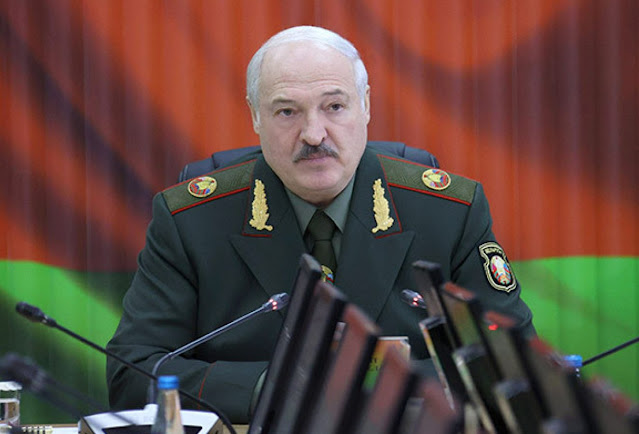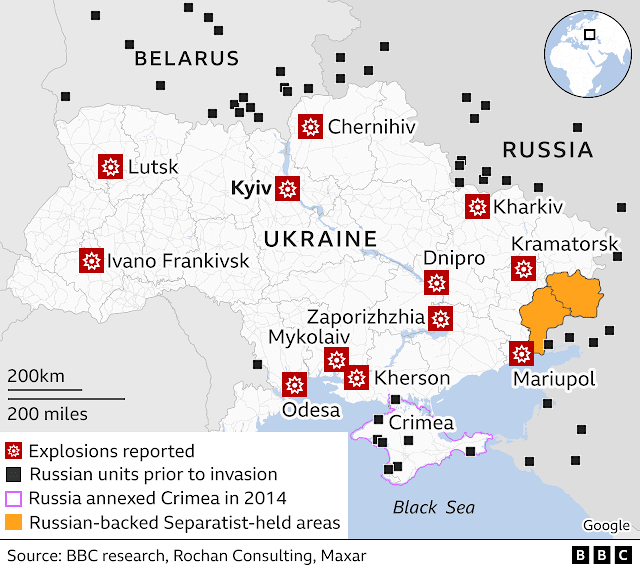TOPIC: Will Belarus Join the Russian Invasion of Ukraine?
Today, Belarus expelled its Ukrainian diplomats and closed Ukraine's Consulate General. Belarusian Foreign Ministry spokesman, Anatoly Glaz stated that the "Ukrainian embassy will continue to work in Belarus in a 1+4 format, meaning an ambassador and four staff members." What the expulsion could mean however, is more ominous. Could this be the prelude for Belarus joining the Russian invasion on Ukraine?
A Series of Ominous Actions
The expulsion of diplomats could ultimately turn out to only be a sign of Belarusian support for its chief ally, Russia, rather than a move closer towards joining the war. Nonetheless, the action of diplomatic expulsions has been indicative in the past of a move towards conflict. Russia for example, closed down its embassy in Kyiv two days before the invasion began on February 24. Belarus's ambassador, Igor Sokol, departed Ukraine on Saturday as Belarus too closed its embassy. President Lukashenko of Belarus has already allowed his territory to be used as a staging platform for the Russian invasion and has recently amended the countries constitution to allow Russian nuclear weapons to be deployed in its territory. Furthermore, Belarusian forces on the Ukrainian border have been beefed up in recent days.
 |
| President Lukashenko of Belarus |
For Ukrainian military experts, things are only pointing in one direction. Ihor Romanenko, a former deputy chief of Ukraine's General Staff, told Al Jazeera reporters that Belarus may join the conflict on Moscow's side. He stated that Minsk may send between 10 and 15 tactical battalions, but only once Moscow finishes the deployment of its reserves and paratroopers from the Pacific fleet that are hastily making their way westwards. From here, these forces may be used to further the stalled Russian advance on Kyiv, or perhaps probe the untested western Ukrainian regions. Indeed, Romanenko is not alone in his suspicions. Major General Viktor Yagun of the Ukrainian Security Service publicly stated that, "A chance of invasion from Belarus is pretty high." Before going on to add that Russia now manages Belarusian forces, not Lukashenko and that these forces may be used to attack major western Ukrainian cities in order to cut-off sources of Western military aid.
In this, there could be a significant portion of truth. Lukashenko, who has historically played both Moscow and the West against one another in order to maintain his position, was forced to pivot dramatically towards Russia following significant democratic protests against his dictatorial regime in 2020. The Kremlin helped Lukashenko survive the largest protests since the nation became independent, following a disputed presidential election that granted Lukashenko a suspicious victory. What followed next was a violent crackdown on protests and tough sanctions from the West that essentially forced Lukashenko into becoming a vassal of Putin. However, when the invasion began, Lukashenko made clear that he was not going to back Putin militarily. Deputy Defence Minister Viktor Gulevich stated more recently that Belarusian troop movements were "in no way connected with the preparation, let alone participation of the Belarusian military in [Russia's] special military operation in Ukraine."
A Lose Lose for Belarus and Ukraine?
Belarusian involvement in Ukraine would be a loss for both Kyiv and Minsk. For Ukraine, it puts pressure on an already stretched military. For Belarus, it puts its small, inexperienced army of just 48,000, into an exceedingly violent conflict, that could crush both the Belarusian military and the incumbent political leadership before a peace is signed. One thing is for sure though, that Ukraine will not stop defending its territory, regardless of the number of opponents that line up against them. Indeed, Ukrainian Security Council head Oleksiy Danilov defiantly noted, "If a single Belarussian soldier crosses the border with Ukraine, he will be destroyed." When considering the fierce bravery of the Ukrainian people in recent weeks, Danilov's statement is not to be doubted.
 |
| Images of the 2020 anti-Lukashenko protests in Belarus. Image Credit: Vasily Fedosenko/Reuters |


Comments
Post a Comment